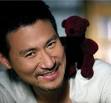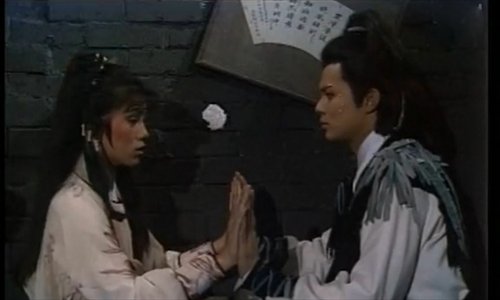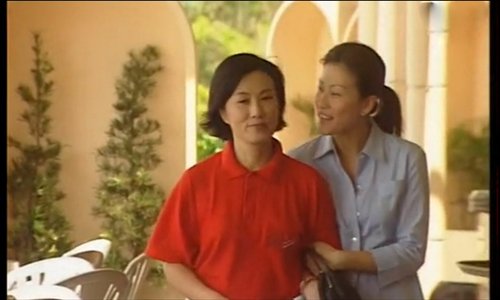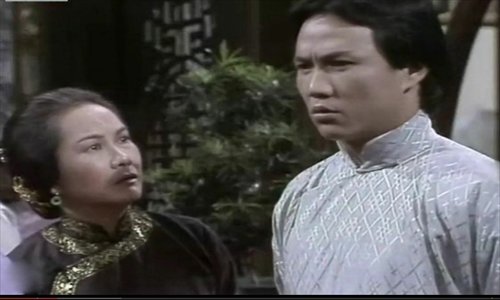As mentioned in my previous post, below is part 2 of the
Singpao article recapping the highest and lowest rated TVB series from the past
2 decades or so. Part 1 covered the
HIGHEST rated series and now Part 2 covers the LOWEST rated ones.
***NOTE: If you haven't read part 1 yet, please do that first before continuing with part 2 because there are some 'disclaimers' in part 1 that are important to note. Thanks!
***NOTE: If you haven't read part 1 yet, please do that first before continuing with part 2 because there are some 'disclaimers' in part 1 that are important to note. Thanks!
I actually don’t have a whole lot to say about the series
on the LOWEST rated list because frankly, I didn’t bother watching some of them
because I was not interested. But there
are 2 series on the list that I DO want to ‘make a case’ for because I strongly
feel that those 2 series were ‘victims’ of circumstances and probably wouldn’t
be on this list if times were different.
The first series that I feel is sort of unjustified is Ultra
Protection – granted, I only saw that series once and it was so long
ago that I really don’t remember a whole lot about the series…but I do remember
thinking to myself that the series actually was quite engaging and the
performances were quite solid as well.
But of course, with the overwhelming popularity of Princess Pearl – a series
that managed to take all of Asia by storm back then – I don’t think any series
that TVB aired would have been able to compete.
Too bad for Ultra Protection, which ended up becoming the ‘sacrificial
lamb’ in the ratings war between TVB and ATV.
The other series that I feel strongly about is The
Intangible Truth. I actually
watched that series for the first time a few months back and even though I can
totally understand why audiences might not like the series (because it
definitely IS a very dark and depressing series), calling it ‘the worst’ series
is absolutely ridiculous. Sure, the
theme might not have been too attractive and given the heavy political
undertones in the series, it probably was a bad idea to make and air this
series in the pre-handover era (especially in the mid-90s, when the anti-China
sentiment was quite heavy in HK and many Hong Kongers were ‘dreading’ the
impending return of HK to China in 1997).
With that said though, the biggest ‘redeeming quality’ for this series
is its cast -- the stellar performances from majority of the cast in this
series was enough to make me overlook the ‘dark’ theme and the political
piece. Roger Kwok actually gave one of
the BEST performances of his career in this series (my humble opinion based on
all the Roger series I’ve watched from the 80s til now) – not only that, the
rest of the cast (including Esther, Sheren, Alex, So Hang Suen, Law Lok Lam,
Lau Kong, Chun Wong, etc.) put in solid performances as well. In fact, watching this series was an
emotional roller coaster for me because there were times where I was so angry I
wanted to slap some sense into the main characters for their ‘stubbornness’ yet
at the same time, I felt so sad for their plight and couldn’t help crying with
them during their moments of desperation.
Overall, this is actually a pretty good series that really should have
been made post 1997 rather than prior….
Anyway…I will ask the same question that I did at the end
of Part 1: What are your thoughts on
this list? Agree? Disagree? Shocked?
Don’t care?
.*******.
Top Ten LOWEST
Rated TVB Series
Source: Singpao
Translation: llwy12
A few months ago, when the finale for popular TVB series Triumph
in the Skies II (衝上雲霄II) aired, it was
able to pull in average ratings of 38 points, peaking at 41 points, which
marked the first time in at least 2 years that TVB was able to break its
‘dismal’ ratings trend. Unfortunately,
most of the series aired after that, including the recent highly touted
SDU-themed thriller Sniper Standoff (神鎗狙擊) were not able to keep up the momentum, with not a single
series able to break the 30 point mark in ratings.
Earlier, we (Singpao) did a recap on TVB’s Top Ten
HIGHEST rated series [from the past 20 years] – now let’s take a look at the
opposite side of the spectrum and recap TVB’s ten LOWEST rated series from the
same time period.
Through a look back at TVB’s highest and lowest rated
series, several conclusions can be drawn, one of which is this: TVB’s ‘habitual ratings’ (慣性收視) phenomenon has helped them stay in
the forefront of the HK television industry the past few decades and will
likely continue to play a huge role in helping them maintain that status in the
future, however relying on this phenomenon alone is unlikely to benefit them in
the long run. TVB needs to put much more
thought into deciding what types of series to produce – a wrong move in this
area could cause them to lose significant audience support as reflected in the
ratings.
Rankings and
summary below (note that this list
should be read differently from the HIGHEST rated series list; the higher the
ranking on the below list, the lower the ratings):
1st PLACE:
Dressage to Win (盛裝舞步愛作戰) [2008] – averaged 14 points, peaked at 20 points
This equestrian-themed series was one of TVB’s rare
attempts at bringing Taiwan’s ‘youthful idol series’ genre to Hong Kong
audiences. Starring Andy Hui (許志安), Mandy Lieu, Michelle Wai (衛詩雅), Ken Hung (洪卓立), etc., this series was the 3rd
installment in TVB’s popular ‘Four Leaf Clover (四葉草)’ franchise. [The first installment
was Hearts
of Fencing (當四葉草碰上劍尖時)
in 2003 and second installment was Sunshine Heartbeat (赤沙印記@四葉草2) in 2004].
The series aired in May of 2008 and with average ratings (for the entire
series) of only 14 points, it ‘tops’ the list as TVB’s lowest rated series,
perhaps of all time.
2nd PLACE: ICAC Investigators 2007 (廉政行動2007)
[2007] – averaged 17 points, peaked at 20
points
Spanning a total of 5 episodes, this series was one of
TVB’s many collaborations with HK’s ICAC bureau that followed the usual format
of multiple individualized stories making up the entire series. With TVB’s director of production Tommy Leung
(梁家樹) personally
serving as producer alongside ICAC Media Relations Bureau Supervisor Law Heung
Lan (羅香蘭) as
co-producer, the series brought together a varying ensemble cast comprised of
popular veterans such as Sunny Chan (陳錦鴻), Michael Miu (苗僑偉), etc. as well as younger favorites such as Teresa Fu (傅穎), Shirley Yeung (楊思琦), etc., with the cast rotating from
one episode to the next. The series
aired starting in October 2006, however it was only able to pull in average
ratings of 17 points – by far the lowest amongst the many ICAC-themed
productions.
3rd PLACE:
Colours of Love (森之愛情) [2007] – averaged 17 points, peaked at 19 points
This series was TVB’s adaptation of Commercial Radio’s
(CRHK) idol drama series of the same name.
Produced by variety program veteran Fok Jak Kei (霍澤基), this 10 episode series also
followed the ‘short story’ format and featured CRHK’s popular DJs Sammy Leung (森美) and Kitty Yuen (阮小儀) starring as the main leads. Though the series boasted a cast of popular
female idols from the television, movie, and music industries such as Ivana
Wong (王菀之),
Stephy Tang (鄧麗欣),
Charlene Choi (蔡卓妍),
Fiona Sit (薛凱琪), Niki
Chow (周麗淇), Fala
Chen (陳法拉),
Miriam Yeung (楊千嬅), etc.
in lead roles for each episode, that did not help the ratings much, as the
series only managed to rake in 19 points at its peak.
4th PLACE:
Dropping by Cloud Nine (你們我們他們) [2011] – averaged 20 points, peaked at 21 points
Adapted from Taiwanese author Jimmy Liao’s (幾米) novel of the same name, this series
was helmed by TVB’s variety program supervisor Ho Siu Wai (何小慧). [TN: Ho Siu Wai was responsible
for most of TVB’s large scale variety programs such as Miss HK Pageants, Tung
Wah Charity shows, etc.] Despite
being one of the ‘recommended’ series during TVB’s 2008/2009 Sales Presentation
as well as boasting a leading cast of popular favorites such as Ron Ng (吳卓羲), Kate Tsui (徐子珊), Mag Lam (林欣彤), Jacqueline Chong (莊思敏), and Taiwanese idol Figaro Tseng (曾少宗), the 10 episode series was only able
to muster a dismal 20 points average ratings.
5th PLACE:
Gentle Reflections (恨鎖金瓶) [1994] – averaged 21 points, peaked at 24 points
As the TVB adaptation of the ancient Chinese classical
novel The Plum in the Golden Vase (金瓶梅), this 20 episode series starred Pal Sinn (單立文) as ‘Ximen Qing’ and Irene Wan (潘金蓮) as ‘Pan Jinlian’
alongside a strong cast that included Kenix Kwok (郭可盈), Liu Kai Chi (廖啟智), Patrick Tam (譚耀文), Savio Tsang (曾偉權),
Gordon Lam (林家棟),
etc. Unfortunately, even a strong cast
was not able to save the series from becoming a ratings disaster, averaging only
21 points throughout its 4 week run.
6th PLACE:
Ultra Protection (非常保鑣) [1999] – averaged 21 points, peaked at 22 points
This 20 episode modern day crime drama was helmed by
‘golden’ producer Mui Siu Ching (梅小青) and featured a stellar cast comprised of Bowie Lam (林保怡), Marianne Chan (陳妙瑛), Eddie Cheung (張兆輝), Steven Ma (馬浚偉), etc. With its popular ‘cop thriller’ theme and
solid cast, the series had all the makings of becoming a hit -- unfortunately,
it was given a timeslot that ended up sinking the series before it had a chance
to prove itself. When the series aired
in August 1999, it was pitted up against Taiwan’s runaway hit Princess
Pearl (還珠格格),
which rival station ATV had bought the rights to broadcast -- in the face of
stiff competition from a series that was so popular throughout all of Asia, Ultra
Protection ended up failing miserably in the ratings department [TN:
this was one of the few times in HK television history where ATV
actually beat TVB in terms of ratings].
In a desperate effort to salvage its ratings, TVB decided to air the new
season of the hugely popular game show Super Trio (驚天動地獎門人), hosted by Eric Tsang (曾志偉), right after Ultra Protection finished
airing.
7th PLACE:
Dragon Love (人龍傳說) [1999] -- averaged 21 points, peaked at 22 points
Produced by Marco Law (羅永賢), this 20 episode ancient romance drama starred Benny Chan
(陳浩民), Fennie Yuen (袁潔瑩), Chin Kar Lok (錢嘉樂), Nicola Cheung (張燊悅), Michael Tse (謝天華), etc. In ‘recovery’ mode after being ‘pummeled’ by
ATV in the ratings department for the first time in 30 years, TVB decided to
air this series in September 1999, right after Princess Pearl finished
airing on ATV. As ‘counter-attack’, ATV
decided to ride on the momentum that Princess Pearl had generated just a
few weeks back by airing the sequel to the popular series, Princess Pearl II, in the
same timeslot. Of course, the result was
just as they expected -- Dragon Love’s ratings were hugely
affected and the series ended up suffering the same fate as the series that
aired before it: average ratings of 21
points, peaking at 22 points.
8th PLACE:
The Intangible Truth (生死訟) [1994] – averaged 21 points, peaked at 21 points
Written and produced by renowned veteran
scriptwriter/producer Tsang Gan Cheung (曾謹昌), The Intangible Truth boasted a
stellar cast of fine actors such as Roger Kwok (郭晉安), Esther Kwan (關詠荷), Sheren Tang (鄧萃雯), Alex Fong (方中信), So Hang Suen (蘇杏璇), Law Lok Lam (羅樂林), etc. Unfortunately though, with its plot
revolving around Mainland China’s criminal court system and the ‘melodramatic
to the point of depressing’ story line, the series was very poorly received by
audiences at that time. Not only did the
series pull in the lowest ratings of all series aired that year, it was also
dubbed ‘the worst series’ because of its overly dark theme.
9th PLACE:
Beauty at War (金枝欲孽貳) [2013] – averaged 21 points,
peaked at 26 points
Prior to its broadcast, Beauty at War was
originally met with huge anticipation – of course, this was primarily due to
its position as the sequel to the tremendously successful War and Beauty (金枝欲孽)
back in 2003, whose finale episode garnered a record breaking [at that time] 40
points average ratings, peaking at 44 points, thereby cementing the series’
status in history as the most ‘classic’ of palace fighting-themed dramas. Unfortunately, the sequel itself did not live
up to expectations. With its storyline
revolving around ‘rumors’ and ‘dreams’, the sequel took a completely different
approach from its predecessor and instead, attempted to ‘explain’ the events
that occurred in the first installment as merely ‘a figment of one’s
imagination’. After the series aired to
disastrously low ratings, analyses were done that indicated the low ratings
were primarily due to the complex, difficult to understand script, which caused
audiences to lose interest. In the end,
the series averaged 21 points, peaking at 26 points.
10th PLACE:
A Stage of Turbulence (刀馬旦) [1995] – averaged 22 points, peaked at ???
This 20 episode pre-modern series starring Sunny Chan (陳錦鴻) and singer Vivian Chow (周慧敏) revolved around the trials and
tribulations of a Cantonese opera troupe in China. The theme song Confidante (紅顏知己) was sung by lead actress Vivian
Chow and the series itself was actually TVB’s 28th year anniversary
series. However, despite its strong cast
and ‘anniversary series’ status, the only managed to pull in average ratings of
22 points.


























